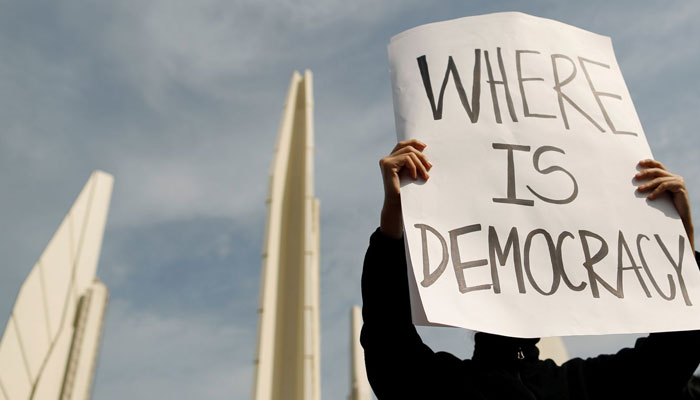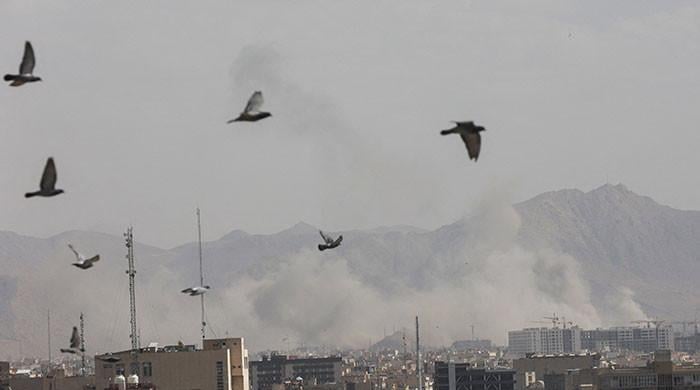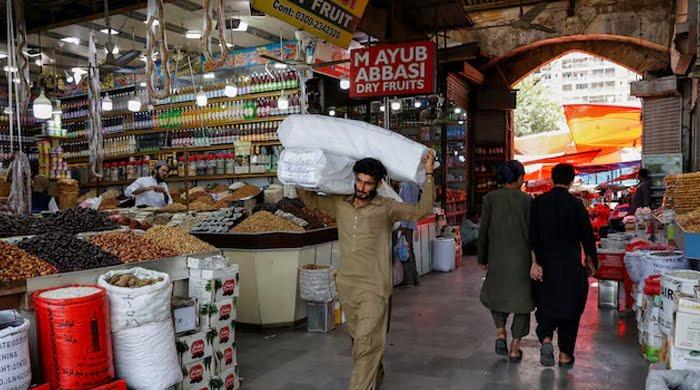In Pakistan’s digitally-enhanced democracy, does Imran Khan have an advantage?
Young men and women are confronted with two choices: exciting champion versus an assortment of disinterested champions
May 10, 2022

Like many millions around the world, I have watched in awe, excitement and horror as a new world order has begun to emerge over the last decade and a half.
At first, the signals were very close to home and very exciting. Pakistan was a global pioneer in digitally fuelled amplification of voice protests with the power to take down established power brokers, and even governments. The Lawyers’ Movement that began in 2007 and ended with victory in 2009 took down the military dictatorship of General Parvez Musharraf and established the judiciary on its rightful perch as a key institution in Pakistan.
A couple of years later, it was easy to feel a sense of kinship and familiarity with my Egyptian sisters and brothers as they organised at Tahrir Square to take down Hosni Mubarak in January 2011. Just two and a half years later, in July 2013, Gen Abdel Fattah el Sisi took over the reins in Cairo.
The hopes and dreams at Tahrir had been replaced by the cold, hard reality of the incompetence of Arab Spring revolutionaries. Egypt’s regional and global salience, and the penury and helplessness of the average Egyptian combined to bring an end to the Tahrir ‘moment’.
Read more: Imran Khan —The digital age populist
Another year later, it was Narendra Modi — the Butcher of Gujarat — that won the Indian general election by a landslide. Years of work to build and sustain dialogue, construct a resolution to the Kashmir conundrum, and normalise the idea of India as a neighbour and potential partner flashed before our eyes. The path Modi has set for India seems irredeemable — as proven by his attack on Pakistan on February 26, 2019 and his attempted annexation of Kashmir on August 5, 2019.
If Modi’s India didn’t convert my excitement about the digitally-fuelled amplification of voice into dread, the June 0216 referendum held in Great Britain to rid itself of the European Union certainly did. Brexit was shocking for most Western neoliberals, but it was triply shocking for a Pakistani centrist whose halting and conditioned admiration for ideas like globalisation, regional economic and political cooperation, and representative democracy had always seemed like luxuries to begin with.
If India was no longer inclusive, even if only for the sake of show and tell, and if Britain was no longer capable of burying the past, and investing in collectivised, cross-border freedom of movement for goods, services and people — then what juxtapositions and finger-pointing gestures were left? Well, there was always America!
A few weeks after the Brexit vote, I watched Donald Trump triumphantly descend a gilded escalator. It could well have been a stairway straight from political heaven. Deflated by the series of defeats to ideas of inclusiveness, and the collective good, I announced to many friends and family that I believed Trump would not only win the Republican Party nomination, he would win the election. Every one of my American friends was aghast: “How could I even imagine such a thing!”
Read more: Can the political chefs reimagine the kitchen?
My response to them was the same as what my response to many friends since the TLP dharna at Faizabad has been: “the outcomes in your country are not measured by the feelings of the shaven and perfumed that are perched comfortably at the top of the food chain and the periphery of the economic carnage that ordinary citizens endure.
The outcomes in your country are determined by those that are able to hack the feelings of ordinary people — whose sanity, love for data and appetite for reasoned debate have all been consumed by indignity, deprivation and a deep rage at the feeling of being left out and laughed at”.
The profound sense of the ordinary citizen having been wronged — deeply, egregiously, severely wronged — has been cultivated, nourished and harvested by bold, ambitious and shameless men and women all around the world to seize and sustain power.
Modi may have been the first, but he is not alone, nor likely the worst. Trump, Orban, Duterte, and Bolsanaro all just represent the first generation of the digital age populists that are a direct product of our era of digitally enhanced democracy.
The Pakistani experience with digitally-fuelled amplification of voice is unique and unlike the many examples, we point to as shorthand. For starters, no other major democratic polity has endured the kind of terrorism that consumed Pakistan from 2007 to 2015 and has reared its ugly face again, as of 2020. Pakistan is also a weaker democracy than most — with a military that enjoys unaccountable and unchallenged power over money, media and the compromised journalists, judges, bureaucrats and politicians that it can manipulate at will.
Read more: Imran Khan’s core support base — who will speak to them?
And this is the rub. In a country where the political centre of gravity, systemic predictability and national stability are all anchored in Rawalpindi, the challenge today is not how to contain the bestial political instincts of a Pakistani Trump, Bolsanaro, Orban, or Duterte. That is a simplified and inaccurate reading of the challenge posed by Imran Khan.
In the era of digitally-enhanced democracy, manufactured by the digitally-fuelled amplification of voice that now shapes and defines the attitudes, perceptions, consumption and will of the people, the challenge is how to come to terms with the democratization of power itself.
I leave the grappling of the assumption that all democratisation is good to the reader herself or himself. But the more profound and urgent question is how a system is supposed to cope with weightlessness when it is programmed to have a centre of gravity that enjoys unaccountable and unchallenged power, accustomed to manipulating all that it surveys, at will?
In short: now that the ARY chickens have come home to roost, what tactical shift is left for a perennially strategically exhausted establishment?
Imran Khan is one manifestation of how this challenge is playing out. What he said in Abbottabad is not dramatically different from what Nawaz Sharif said in Gujranwala. So why does one cause a political earthquake that only shakes us up a little, while the other takes out whole city blocks?
Read more: One step forward abroad, two steps back at home
We overvalue the content and the message delivery mechanism. We undervalue the audience and its reaction. Well, Imran Khan doesn’t. Khadim Hussain Rizvi did not. But most of us do. What Mr Khan and the dearly departed Mr Rizvi understand better than us is the digitally-fuelled amplification of voice. They enjoy power because they successfully hack the audience.
In a digitally-enhanced democracy, the audience is always right. But what the audience wants and responds to is largely in the hands of whoever establishes authenticity with the audience. The simple fact is that every false allegation that Khan makes carries with it a certification of authenticity by the most important authority in a digitally-enhanced democracy: the audience itself.
Little does the audience realise that the ‘neutral’ platforms that they trust to tell it like it is are themselves hacked — by state power, by big money, and even by their trusted, handsome and honest pinup heroes.
Iran and Russia have mastered the dark arts of hacking digitally enhanced democracies — and Pakistan is most definitely in their crosshairs. American experts claim that the Trump electoral victory was in large part influenced by Russian dark arts.
Many in France and Germany make similar claims about the rise of dangerous right-wing individuals and tropes in those countries. Today, as traditional power brokers look up and down, left and right, and struggle to make sense of how dramatically they have lost control of the national discourse, the natural instinct will be to externalize, just like the Yankees, the French and the Germans do.
Read more: The Khan News — a one man show?
But to be sure, these excuses are a copout from a more important conversation about elite capture. People’s sense of indignity, deprivation and being left out and laughed at is not imaginary. In many cases, it may be exaggerated, but in many more, it is yet to be articulated.
The young women and men that have just turned 18 in Pakistan were three and four years old when the chanting against General Musharraf began, they were only seven and eight years old when the magic of Tahrir Square filled the imagination with hope and ambition. As they enter adulthood, they are confronted with broadly two choices: an exciting, fiery and passionate champion for their sense of dignity versus an assortment of disinterested, awkward and self-conscious champions for a “system” that just doesn’t work.
Who do you think is going to win this battle?
The writer is an analyst and commentator.
Originally published in The News











